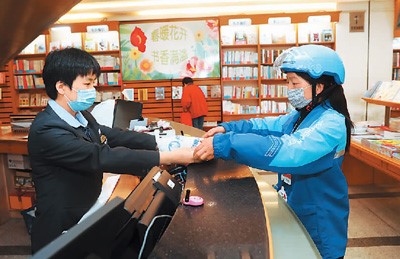

Chinese food delivery giants, including Eleme and Meituan, have been exploring the local services market, delivering a variety of retail goods and offering door-to-door services such as manicures, hairdressing and domestic services to customers.

A courier from Eleme, an online food delivery platform, picks up books ordered by a client from a Xinhua Bookstore outlet in Shanghai. (Photo by Ding Ting/Xinhua)
As a result, in addition to food delivery, Chinese couriers are now also running all kinds of errands from buying bottled water or vegetables for customers, to queuing up and delivering medicine.
“Apart from buying vegetables and cigarettes for customers, I’ve also put out the trash and delivered fresh flowers for them,” said a courier surnamed Ding, who is over 60 years old and has more than five years of experience working in the food delivery sector.
“I mainly take orders for takeout food at noon and in the evening, and also errand-running orders during the off-peak period for food delivery,” Ding noted, adding that he has received more errand-running orders in recent years, mainly for delivering medicine and buying vegetables and daily necessities for customers.
Eleme recently updated its app and announced its expansion to local services. According to an executive from the company, the move is underpinned by growing demand for these services from consumers.
In 2019, the total trade volume of China’s internet-based consumer services market exceeded 2 trillion yuan, an increase of 45.3 percent year on year, according to an industrial report.
“Local services are very lucrative,” said Chen Liteng, an analyst from the China E-Commerce Research Center.
The recent expansion by China’s food delivery behemoths has intensified the fierce competition in the country’s local services market.
 Fire brigade in Shanghai holds group wedding
Fire brigade in Shanghai holds group wedding Tourists enjoy ice sculptures in Datan Town, north China
Tourists enjoy ice sculptures in Datan Town, north China Sunset scenery of Dayan Pagoda in Xi'an
Sunset scenery of Dayan Pagoda in Xi'an Tourists have fun at scenic spot in Nanlong Town, NW China
Tourists have fun at scenic spot in Nanlong Town, NW China Harbin attracts tourists by making best use of ice in winter
Harbin attracts tourists by making best use of ice in winter In pics: FIS Alpine Ski Women's World Cup Slalom
In pics: FIS Alpine Ski Women's World Cup Slalom Black-necked cranes rest at reservoir in Lhunzhub County, Lhasa
Black-necked cranes rest at reservoir in Lhunzhub County, Lhasa China's FAST telescope will be available to foreign scientists in April
China's FAST telescope will be available to foreign scientists in April "She power" plays indispensable role in poverty alleviation
"She power" plays indispensable role in poverty alleviation Top 10 world news events of People's Daily in 2020
Top 10 world news events of People's Daily in 2020 Top 10 China news events of People's Daily in 2020
Top 10 China news events of People's Daily in 2020 Top 10 media buzzwords of 2020
Top 10 media buzzwords of 2020 Year-ender:10 major tourism stories of 2020
Year-ender:10 major tourism stories of 2020 No interference in Venezuelan issues
No interference in Venezuelan issues
 Biz prepares for trade spat
Biz prepares for trade spat
 Broadcasting Continent
Broadcasting Continent Australia wins Chinese CEOs as US loses
Australia wins Chinese CEOs as US loses